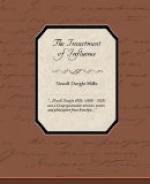In the world of business, also, the time element exerts striking influence. To-day our land is filled with men who have sown the seed of thought and purpose, but whose harvest is of so high a quality that with long patience must they wait for the fruition. How pathetic the reverses of the last four years. The condition of our land as to the overthrows of its leaders answers to the condition in Poland when Kossuth and his fellow patriots, accustomed to life’s comforts and its luxuries, went forth penniless exiles to accustom themselves to menial toil, to hardship and extreme poverty. His heart must be of iron who can behold those who have been leaders of the industrial column, who now stand aside and see the multitude sweep by. Just at the moment of expected victory misfortune overtook them and brought their structure down in ruins. And because the seed they have sown is not physical, but mental and moral, the fruition is long postponed.
Walter Scott tells the story of a wounded knight, who took refuge in the castle of a baron that proved to be a secret enemy and threw the knight into a dungeon; one day in his cell the knight heard the sound of distant music approaching. Drawing near the slit in the tower, he saw the flash of swords and heard the tramp of marching men. At last the wounded hero realized that these were his own troops, marching by in ignorance of the fact that the lord of this castle was also the jailer of their general. While the knight tugged at his chain, lifted up his voice and cried aloud, his troops marched on, their music drowning out his cries. Soon the banners passed from sight, the last straggler disappeared behind the hill and the captive was left alone. The brave knight died in his dungeon, but the story of his heroism lived. What the knight learned in suffering the poets have taught in song. The captive hero has a permanent place in civilization, though the foresight of his influence was denied him.
Those whose harvest is delayed are a great company. Elizabeth Barrett Browning exclaiming, “I have not used half the powers God has given me,” poets dying ere the day was half done; the inventors and reformers denied their ideals; obscure and humble workmen—the mechanic who emancipates man by his machine; the artisan whose conveniences are endless benefactions to our homes; the smith whose honest anchor holds the ship in time of storm—all these labored and died without seeing the fruitage, but other men entered into their labors.




